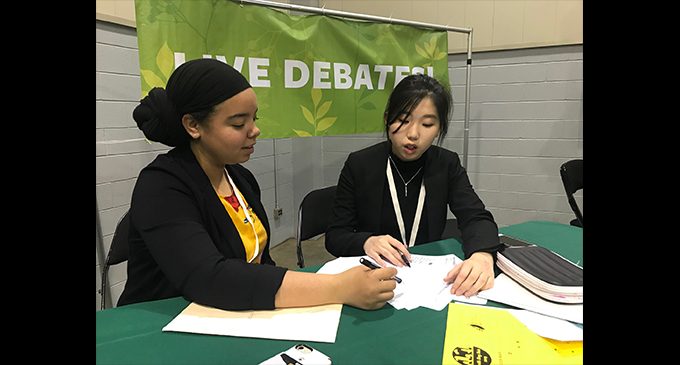Forsyth Early College team wins debate against banning cars in central downtown

By Judie Holcomb-Pack
Despite the rainy day, hundreds of people turned out at the Piedmont Earth Day Fair on Saturday, April 13, at the fairgrounds’ education building. Dozens of attendees were there to cheer on the students from Forsyth Early College and Atkins High School who competed in the 4th annual Piedmont Earth Day debate.
The first round of the debate was held on March 16 at Wake Forest University, where 62 students from six high schools competed. The debate teams from Forsyth Early College and Atkins High School were selected to compete in the final round that was held at the Piedmont Earth Day Fair on Saturday. Representing Forsyth Early College were Aisha Riddick and Michelle Cho, and representing Atkins High School were Ghazal Mizazadeh and Kiran Kapileshwari.
Madeline Coffey, communications and engagement coordinator for Piedmont Environmental Alliance (PEA), said that the Wake Forest University debate club helped coordinate both debates. She added, “The annual debate tournament is an opportunity for students to not only learn and research an important topic, but it’s an opportunity for them to grow their communication skills, gain confidence, and be mentored by some of the best debaters in the country.” Coffey also noted that some schools have debate teams and others do not, but all had faculty coaches to help them prepare for the debate. She said that research showed that students who participated in debate clubs had higher SAT scores and higher rates of college acceptances.
The debate question presented at both the first debate in March and the final round on Saturday was: Should Triad cities ban cars in central/downtown areas? Forsyth Early College team won the coin toss before the debate and chose to represent the con side; Atkins High School team represented the pro side. Judges were: Mike Silver, deputy commissioner, N.C. Industrial Commission; Barry Nelson, chief geologist and corporate president, Northwest Geoscience; and Natalie Bennie, a graduate student at Wake Forest University. Teams were judged on speech, rebuttal and crossfire, use of evidence, and respect, and each round was timed.
Both teams came prepared and were super-focused, with notes in hand and ready to compete. All the students presented compelling reasons for both supporting the ban of cars and objecting to the ban. When asked how they prepared for the debate, both teams said, “Research, lots and lots of research.” Kiran Kapileshwari of Atkins also said that since the first debate in March, she and Ghazal Mizazadeh had been reviewing the weaknesses of their arguments and looking to strengthen them. They all mentioned spending a lot of time on the Internet, which was evident in their presentations. The Atkins team had gone so far as to interview local businesses to get their opinion about the topic, and the Forsyth Early College team had researched facts associated with lack of public transportation. Both teams were quite impressive in their knowledge of the question, the economic impact, and the science behind their position.
The judges admitted it was a close match, but Forsyth Early College edged out Atkins for the trophy. Mayor Allen Joines was on hand to present trophies to the winners, Aisha Riddick and Michelle Cho. When asked which side of the question he favored, he replied, “Although some cities with higher density have done it, we’re not quite ready for it here.”









